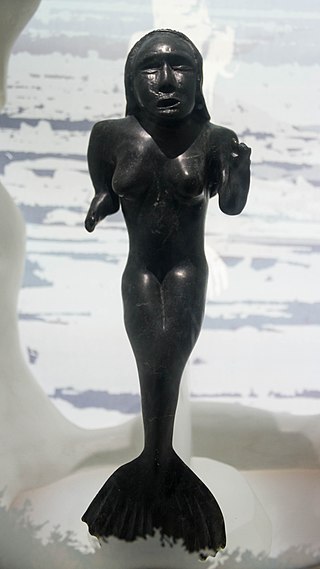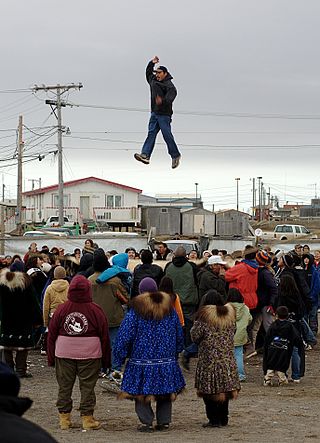Related Research Articles

Inuit religion is the shared spiritual beliefs and practices of the Inuit, an indigenous people from Alaska, northern Canada, parts of Siberia, and Greenland. Their religion shares many similarities with some Alaska Native religions. Traditional Inuit religious practices include animism and shamanism, in which spiritual healers mediate with spirits. Today many Inuit follow Christianity ; however, traditional Inuit spirituality continues as part of a living, oral tradition and part of contemporary Inuit society. Inuit who balance indigenous and Christian theology practice religious syncretism.
The British Poetry Revival is the general name now given to a loose movement in the United Kingdom that took place in the late 1960s and 1970s. The term was a neologism first used in 1964, postulating a New British Poetry to match the anthology The New American Poetry (1960) edited by Donald Allen.

Edward Merton Dorn was an American poet and teacher often associated with the Black Mountain poets. His most famous work is Gunslinger.

Lee Harwood was an English poet associated with the British Poetry Revival.
Andrew Thomas Knights Crozier was a poet associated with the British Poetry Revival.
Michael Peter Leopold Hamburger was a noted German-British translator, poet, critic, memoirist and academic. He was known in particular for his translations of Friedrich Hölderlin, Paul Celan, Gottfried Benn and W. G. Sebald from German, and his work in literary criticism. The publisher Paul Hamlyn (1926–2001) was his younger brother.
Paul Durcan is an Irish poet.

Peter Robinson is a British poet born in Salford, Lancashire.

Vahni Anthony Ezekiel Capildeo is a Trinidad and Tobago-born British writer, and a member of the extended Capildeo family that has produced notable Trinidadian politicians and writers.
Michael Schmidt OBE FRSL is a Mexican-British poet, author, scholar and publisher.
Peter Riley is a contemporary English poet, essayist, and editor. Riley is known as a Cambridge poet, part of the group loosely associated with J. H. Prynne which today is acknowledged as an important center of innovative poetry in the United Kingdom. Riley was an editor and major contributor to The English Intelligencer. He is the author of ten books of poetry, and many small-press booklets. He is also the current poetry editor of the Fortnightly Review and a recipient of the Cholmondeley Award in 2012 for "achievement and distinction in poetry".
Jeremy Hooker FRSL FLSW is an English poet, critic, teacher, and broadcaster. Central to his work are a concern with the relationship between personal identity and place.
Ken Edwards is a poet, editor, writer and musician who has lived in England since 1968. He is associated with The British Poetry Revival.

Nalukataq is the spring whaling festival of the Iñupiat of Northern Alaska, especially the North Slope Borough. It is characterized by its namesake, the dramatic Eskimo blanket toss. "Marking the end of the spring whaling season," Nalukataq creates "a sense of being for the entire community and for all who want a little muktuk or to take part in the blanket toss....At no time, however, does Nalukataq relinquish its original purpose, which is to recognize the annual success and prowess of each umialik, or whaling crew captain....Nalukataq [traditions] have always reflected the process of survival inherent in sharing...crucial to...the Arctic."

The Tikiġaġmiut, an Iñupiat people, live two hundred miles north of the Arctic Circle, 330 mi (530 km) southwest of Utqiagvik, Alaska, in the village of Point Hope. The Tikigaq are the oldest continuously settled Native American site on the continent. They are native whale hunters with centuries of experience co-existing with the Chukchi Sea that surrounds the Point Hope cape on three sides. "Tikiġaq" means "resembles an index finger " in the Iñupiaq language.
Richard Berengarten is an English poet. Having lived in Italy, Greece, the US and the former Yugoslavia, his perspectives as a poet combine English, French, Mediterranean, Jewish, Slavic, American and Oriental influences. His poems explore historical and political material, inner worlds and their archetypal resonances, and relationships and everyday life. His work is marked by its multicultural frames of reference, depth of themes, and variety of forms. In the 1970s, he founded and ran the international Cambridge Poetry Festival. He has been an important presence in contemporary poetry for the past 40 years, and his work has been translated into more than 90 languages.
Roger Francis Langley was an English poet and diarist. During his life, he was loosely affiliated with the Cambridge poetry scene.

Uvavnuk was an Inuk woman born in the 19th century, now considered an oral poet. The story of how she became an angakkuq, and the song that came to her, were collected by European explorers of Arctic Canada in the early 1920s. Her shamanistic poem-song, best known as "Earth and the Great Weather", has been anthologised many times.
David Chaloner was an English poet associated with the British Poetry Revival, and a prominent British designer.
The Schlegel-Tieck Prize for German Translation is a literary translation award given by the Society of Authors in London. Translations from the German original into English are considered for the prize. The value of the prize is £3,000, while the runner-up now receives £1,000. The prize is named for August Wilhelm Schlegel and Ludwig Tieck, who translated Shakespeare to German in the 19th century.
References
- ↑ "Tom Lowenstein", The Poetry Society.
- 1 2 3 4 "Bio", Tom Lowenstein website.
- ↑ "Tom Lowenstein", Carcanet Press.
- ↑ "Tom Lowenstein | Fellow: Awarded 1979", John Simon Guggenheim Memorial Foundation.
- ↑ "Sun, Moon and Women Shouting", Ed Hughes website.
- ↑ "Cryng Bird, Echoing Star", Gramophone.
- ↑ "Companion of Angels Performances", Blake Newsletter, Volume 41 · Issue 2, Fall 2007.
- ↑ "The Death of Mrs. Owl" at Carcanet.